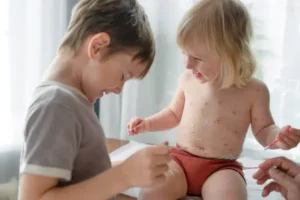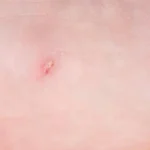What Are Warts? An Overview

Warts are benign (non-cancerous) skin growths caused by an infection with the human papillomavirus (HPV). This virus enters the body through tiny cuts, abrasions, or scratches on the skin, leading to abnormal cell growth. Warts are common in children, as their immune systems may not be fully developed, making them more susceptible to infections.
They can appear on various parts of the body, but they most often develop on the hands, feet, and face.
Common Types of Warts in Children
1. Plantar Warts
Plantar warts develop on the soles of the feet and often appear flat due to the pressure exerted while walking. They can be painful and may have small black dots, which are actually clotted blood vessels. Plantar warts are commonly contracted from walking barefoot in public areas like pools or locker rooms.
2. Common Warts
These are the most frequent types and usually manifest on the hands or face. Characterized by a rough, raised surface, they can be round or irregular and may range in color from white to gray or brown. Common warts are caused by skin-to-skin contact or touching contaminated surfaces.
3. Flat Warts
Flat warts are generally smaller and smoother than other types. They typically appear on the face, hands, or legs and may come in shades of yellow, brown, or match the skin tone. These warts tend to grow in clusters, sometimes reaching up to 100 warts in one area, and are more prevalent in children and teenagers.
4. Filiform Warts
Filiform warts are long, narrow growths commonly found around the mouth, nose, or eyes. They grow quickly and may require medical attention if they cause discomfort or interfere with breathing or swallowing.
5. Periungual Warts
These warts form around the edges of the fingernails or toenails. They can cause discomfort, affect nail growth, and increase the risk of bacterial infection in the nail area.
Causes and Risk Factors for Warts in Children
1. HPV Transmission
The HPV virus responsible for warts can be easily transmitted through direct contact with infected skin or surfaces contaminated with the virus, such as towels, toys, or floors. The virus thrives in warm and moist environments, increasing the likelihood of transmission in places like swimming pools or gyms.
2. Factors That Increase the Risk of Warts
- Weakened Immune System: Children with a weakened immune system are more prone to viral infections, including HPV.
- Skin Injuries or Cuts: Cuts or abrasions provide an entry point for the virus.
- Sharing Personal Items: Using shared items like towels, footwear, or nail clippers can spread the virus.
A pediatrician can evaluate the situation and offer additional treatment options. To find the right pediatric care, search for a pediatric near you in NJ to ensure your child receives the best possible care for their condition.
How to Identify Different Types of Warts
1. Symptoms of Each Type
- Plantar Warts: Flat and painful, often with small black dots in the center.
- Common Warts: Rough and raised with a bumpy surface, typically on the hands.
- Flat Warts: Smooth and small, appearing in clusters on the face or hands.
- Filiform Warts: Long and narrow, growing rapidly around the face.
- Periungual Warts: Located around nails, causing potential deformities.
2. Differentiating Warts from Other Skin Conditions

Warts may sometimes be confused with other skin issues, including corns, calluses, or skin tags. Seeking the advice of a dermatologist can provide clarity and confirm the diagnosis.
Treatment Options for Warts in Children
1. Over-the-Counter Treatments
These include topical products containing salicylic acid, which helps to dissolve warts over time. Using such treatments requires consistent application for several weeks.
2. Prescription Treatments
If over-the-counter treatments are ineffective, a doctor may recommend stronger topical medications, cryotherapy (freezing the wart), or laser therapy.
3. Home Remedies for Warts
Home treatments like duct tape occlusion or applying apple cider vinegar are popular but should be used cautiously to avoid skin irritation. Always consult a healthcare professional before starting any home treatment.
4. When to See a Doctor
Seek medical attention if warts are painful, spreading rapidly, or not responding to over-the-counter treatments. Warts that change in appearance or cause significant discomfort should also be evaluated by a healthcare provider.
For parents seeking effective solutions, discovering the best wart treatment for kids in New Jersey can ensure your child receives safe and gentle care. At Fayrouz Children’s Clinic, our specialists offer expert evaluations and customized treatment plans to address warts and restore your child’s skin health. Reach out to schedule an appointment today!
Care Instructions for Children with Warts
- Maintain Clean Skin: Regularly wash the affected area and keep it dry.
- Avoid Scratching: Scratching warts can spread the virus to other parts of the body.
- Cover Warts: Use bandages or medical tape to reduce the risk of spreading the virus to others.
Prevention Tips for Warts in Children
- Practice Good Hygiene: Teach children to wash their hands frequently and avoid touching their faces.
- Strengthen the Immune System: Encourage a balanced diet rich in vitamins and minerals to boost the immune system.
- Avoid Sharing Personal Items: Ensure children do not share towels, shoes, or grooming tools.
Frequently Asked Questions about Warts in Children
- Can warts spread?
Yes, warts can spread through direct contact with the wart or shared surfaces.
- Are warts dangerous?
While warts are usually harmless, they can be uncomfortable and cause cosmetic concerns.
- How long do warts last?
Warts can last from a few months to several years, depending on the individual’s immune response.
Understanding warts in children is crucial for effective management and prevention. By recognizing the different types of warts, their causes, and treatment options, parents can take informed steps to help their children. If you have concerns about your child’s warts or need guidance on treatment, don’t hesitate to seek professional help.
At Fairouz Children’s Clinic, we are here to assist you with all skin issues, including warts. Contact us today to schedule an appointment with one of our specialized doctors and restore your child’s skin health!